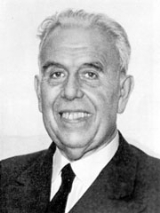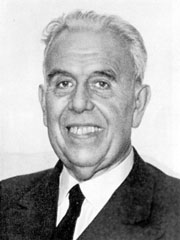
Edmond Privat
Encyclopedia
Edmond Privat was a Francophone
Swiss Esperantist
. A historian
, university professor, author, journalist and peace activist, he was a graduate of the University of Geneva
and a lecturer for the World Peace Foundation. His collective works consist of original drama
s, poems, stories
, textbooks and books about the Esperanto movement.
 Having already learned Esperanto
Having already learned Esperanto
in childhood, Privat and fellow student Hector Hodler
founded in 1903 the journal Juna Esperantisto (The Young Esperantist). Though still an adolescent in 1905, he walked 600 kilometres to participate in the first World Congress of Esperanto
in Boulogne-sur-Mer
, France
, where he spoke with mature eloquence.
At the 1907 International Socialist Congress, Privat advocated the use of Esperanto by the International Socialist Bureau in Brussels. Privat served as a committee member of the World Esperanto Association
(in Esperanto "UEA: Universala Esperanto-Asocio") beginning in 1912. From 1920 until 1934, he was editor-in-chief of Esperanto's eponymous official magazine. From 1924 until 1938 he was president of the UEA and at the same time president of the International Central Committee. He resigned after a scandal. Privat advanced the international Esperanto organization inside and outside UEA.
His works History of the Esperanto language (in two volumes) and The Life of Zamenhof
made him one of the most important historians of Esperanto. As the first historian of Esperanto and Zamenhof's first biographer, he used his connections within Swiss academia to further Esperanto. He authored a linguistic study Esprimo de sentoj en Esperanto (Expression of feelings in Esperanto), is the author of the lyrical Ginevra and of the poem anthology Tra l'silento (Through the Silence). Also, he wrote books teaching Esperanto, Karlo and Course Reader.
During the years 1923-1926, Privat was a vice-delegate of Iran
at the League of Nations
. He presented Esperanto at the League of Nations, at the International Labour Organization
(ILO) and at the Universal Telegraph Union. He was a brilliant organizer, and arranged many international conferences about Esperanto instruction in Geneva
(1922).
Francophone
The adjective francophone means French-speaking, typically as primary language, whether referring to individuals, groups, or places. Often, the word is used as a noun to describe a natively French-speaking person....
Swiss Esperantist
Esperantist
An Esperantist is a person who speaks or uses Esperanto. Etymologically, an Esperantist is someone who hopes...
. A historian
Historian
A historian is a person who studies and writes about the past and is regarded as an authority on it. Historians are concerned with the continuous, methodical narrative and research of past events as relating to the human race; as well as the study of all history in time. If the individual is...
, university professor, author, journalist and peace activist, he was a graduate of the University of Geneva
University of Geneva
The University of Geneva is a public research university located in Geneva, Switzerland.It was founded in 1559 by John Calvin, as a theological seminary and law school. It remained focused on theology until the 17th century, when it became a center for Enlightenment scholarship. In 1873, it...
and a lecturer for the World Peace Foundation. His collective works consist of original drama
Drama
Drama is the specific mode of fiction represented in performance. The term comes from a Greek word meaning "action" , which is derived from "to do","to act" . The enactment of drama in theatre, performed by actors on a stage before an audience, presupposes collaborative modes of production and a...
s, poems, stories
Narrative
A narrative is a constructive format that describes a sequence of non-fictional or fictional events. The word derives from the Latin verb narrare, "to recount", and is related to the adjective gnarus, "knowing" or "skilled"...
, textbooks and books about the Esperanto movement.
Esperanto activity

Esperanto
is the most widely spoken constructed international auxiliary language. Its name derives from Doktoro Esperanto , the pseudonym under which L. L. Zamenhof published the first book detailing Esperanto, the Unua Libro, in 1887...
in childhood, Privat and fellow student Hector Hodler
Hector Hodler
Hector Hodler was a Swiss Esperantist who had a strong influence on the early Esperanto movement....
founded in 1903 the journal Juna Esperantisto (The Young Esperantist). Though still an adolescent in 1905, he walked 600 kilometres to participate in the first World Congress of Esperanto
World Congress of Esperanto
The World Congress of Esperanto has the longest tradition among international Esperanto conventions, with an almost unbroken run of more than a hundred years. The congresses have been held since 1905 every year, except during World Wars I and II...
in Boulogne-sur-Mer
Boulogne-sur-Mer
-Road:* Metropolitan bus services are operated by the TCRB* Coach services to Calais and Dunkerque* A16 motorway-Rail:* The main railway station is Gare de Boulogne-Ville and located in the south of the city....
, France
France
The French Republic , The French Republic , The French Republic , (commonly known as France , is a unitary semi-presidential republic in Western Europe with several overseas territories and islands located on other continents and in the Indian, Pacific, and Atlantic oceans. Metropolitan France...
, where he spoke with mature eloquence.
At the 1907 International Socialist Congress, Privat advocated the use of Esperanto by the International Socialist Bureau in Brussels. Privat served as a committee member of the World Esperanto Association
World Esperanto Association
The World Esperanto Association is the largest international organization of Esperanto speakers, with members in 121 countries and in official relations with the United Nations and UNESCO. In addition to individual members, 70 national Esperanto organizations are affiliated to UEA...
(in Esperanto "UEA: Universala Esperanto-Asocio") beginning in 1912. From 1920 until 1934, he was editor-in-chief of Esperanto's eponymous official magazine. From 1924 until 1938 he was president of the UEA and at the same time president of the International Central Committee. He resigned after a scandal. Privat advanced the international Esperanto organization inside and outside UEA.
His works History of the Esperanto language (in two volumes) and The Life of Zamenhof
The Life of Zamenhof
The Life of Zamenhof is biography of Zamenhof, the founder of Esperanto, written in Esperanto by Edmond Privat. The first edition was in 1920 with 208 pages, and the second edition was in 1923 with 109 pages...
made him one of the most important historians of Esperanto. As the first historian of Esperanto and Zamenhof's first biographer, he used his connections within Swiss academia to further Esperanto. He authored a linguistic study Esprimo de sentoj en Esperanto (Expression of feelings in Esperanto), is the author of the lyrical Ginevra and of the poem anthology Tra l'silento (Through the Silence). Also, he wrote books teaching Esperanto, Karlo and Course Reader.
During the years 1923-1926, Privat was a vice-delegate of Iran
Iran
Iran , officially the Islamic Republic of Iran , is a country in Southern and Western Asia. The name "Iran" has been in use natively since the Sassanian era and came into use internationally in 1935, before which the country was known to the Western world as Persia...
at the League of Nations
League of Nations
The League of Nations was an intergovernmental organization founded as a result of the Paris Peace Conference that ended the First World War. It was the first permanent international organization whose principal mission was to maintain world peace...
. He presented Esperanto at the League of Nations, at the International Labour Organization
International Labour Organization
The International Labour Organization is a specialized agency of the United Nations that deals with labour issues pertaining to international labour standards. Its headquarters are in Geneva, Switzerland. Its secretariat — the people who are employed by it throughout the world — is known as the...
(ILO) and at the Universal Telegraph Union. He was a brilliant organizer, and arranged many international conferences about Esperanto instruction in Geneva
Geneva
Geneva In the national languages of Switzerland the city is known as Genf , Ginevra and Genevra is the second-most-populous city in Switzerland and is the most populous city of Romandie, the French-speaking part of Switzerland...
(1922).
Famous Works
- Karlo (reading book, 1909)
- At the Heart of Europe (brochure, 1909)
- A Living Language of a Living People (1910)
- About Esperanto Literature (1912)
- The Last Kiss (1912)
- Through the Silence (original poems), 1912)
- Ginevra (original drama-legend in verse, 1913)
- Course reader (1913)
- History of the Esperanto Language (two volumes, 1912, 1927)
- The Life of ZamenhofThe Life of ZamenhofThe Life of Zamenhof is biography of Zamenhof, the founder of Esperanto, written in Esperanto by Edmond Privat. The first edition was in 1920 with 208 pages, and the second edition was in 1923 with 109 pages...
(1920) - Expression of Senses in Esperanto (1931) linguistic study
- Conduct between Peoples (philosophy, 1934) psychological study of international problems
- Federal Experience (1958)
- Collective Works of Youth (1960) (includes Through the Silence)
- Adventures of a Pioneer (1963) amusing stories about serious encounters and events
- Life of Gandhi (1967)
- Two Speeches
Sources
- This article is taken in large part from the Edmond Privat article on the Esperanto Wikipedia.
- The Esperanto Book: Appendix 4. Online. September 18, 2007.
- Esperanto Introduction. Online. September 18, 2007.
- Forster, Peter Glover. The Esperanto Movement @ Google Books. Online. September 18, 2007.
- Matthias, Ulrich. Esperanto - The New Latin for the Church and for Ecumenism @ Esperanto - The New Latin for the Church and for Ecumenism. Online September 18, 2007.
- Weekly Worker 409 Thursday November 22 2001. Online. September 18, 2007.

